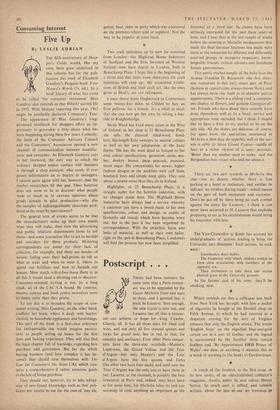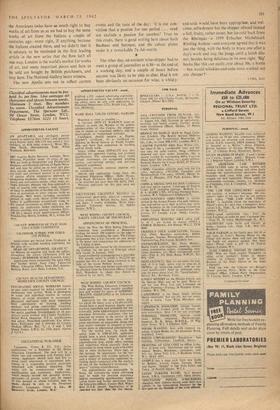Postscript .
THERE had been rumours for some time that a Paris restaur- ant was to be upgraded by the Guide Michelin from two stars to three, and I guessed that it must be Lasserre. Sure enough, the new Guide is now out, and Lasserre has all that a restaur- ant can achieve or hope for—king, Cawdor, Glamis, all. It has all three stars for food and wine, and not only all five crossed spoons and forks for grand luxe, but in red, at that, for amenity and ambiance. Four other Paris restaur- ants have the three-star. accolade—Maxim's, Lap6rouse, the Grand Vefour and the Tour d'Argent—but only Maxim's and the Tour d'Argent have the five spoons and forks (the other two have four each), and until now the Tour d'Argent was the only one to have them in red. Lasserre, at the moment, is possibly the best restaurant in Paris and, indeed, may have been so for some time, for Michelin takes its task too seriously to rush anything so important as the
bestowal of a third star. Its claims have been seriously canvassed for the past three years at least, and I hear that in the last couple of weeks before the meeting at Michelin headquarters that made the final decision fourteen test meals were eaten at the restaurant by different and differently assorted groups of incognito inspectors, know- ledgeable friends, critical advisers and fastidious female gastronomes.
This newly exalted temple of the belly is in the Avenue Franklin D. Roosevelt—the first three- star restaurant in this very smart part of Paris (fashion in capital cities always moves West), and has always been chic both as to clientele and to appointments. There is a sliding roof, a conspicu- ous display of flowers, and genuine Georgian sil- ver. Friends who have dined there recently have done themselves well at £4 a head, service' and appropriate wine included, but I think I should like to have a fiver in my pocket to be on the safe side. All the dishes are delicious, of course, but apart from the specialities mentioned in Michelin a dish they do superbly well in the sea- son is roble de lievre Grand Veneur—saddle of hare in a richer version of a sauce poivrade. `Better than my mother used to make,' said the Burgundian bon vivant who told me about it.
There are two new symbols in Michelin this year—one to denote whether there is free parking at a hotel or restaurant, and another to indicate `no wireless during meals'—which means on the part of both restaurant and customer. Don't be put off by there being no such symbol against the entry for Lasserre: I think it can never have occurred to M. Lasserre that anybody proposing to eat at his establishment would bring his transistor with him.
* The Vice-Chancellor at Keele has accused his undergraduates of `actions tending to bring the University into disrepute.' Such actions. he said. were: Unorthodox dress habits.
The frequency with which students tended to form close associations with members of the opposite sex.
Their inclination to take short cuts across planted grass in the University grounds.
As the farmer said of his sons: they'll be smoking, next.
Which reminds me that a colleague just back from New York has brought with him a packet of cigarettes he bought at the Dunhill shop on Fifth Avenue, to which he had resorted in a desperate craving for the sort of Virginia tobacco that only the English smoke. The words `English Style' on the dignified blue-and-gold carton are in a sort of Gothic, and the legend is surmounted by the familiar three ostrich feathers and, `By Appointment HRH Prince of Wales'—no date, or anything. I mention this as a word of warning to the beaks at Gordonstoun.
*
A touch of the forelock to the first issue, in its new series, of an old-established collector's magazine, Apollo, under its new editor,• Denys Sutton. So much cant is talked, and rubbish written, about the loss of our art treasures to
the Americans (who have as much right to buy works of art from us as we had to buy the same works of art from the Italians a couple of centuries ago--more right, if anything, because the Italians created them, and we didn't) that it is salutary to be reminded in the first leading article in the new series that the flow isn't all one way. London is the world's market for works of art, and many important pieces sent here to be sold arc bought by British purchasers, and stay here. The National Gallery bears witness.
The new Apollo sets out to reflect current events and the taste of the day: 'it is our con- viction that a passion for one period . . . need not exclude a passion for another.' True to this credo, there is good writing here about both Bauhaus and baroque, and the colour plates make it a remarkable 7s. 6d.-worth.
The other day, an eminent wine-shipper had to meet a group of journalists at 6.30—at the end of a working day, and a couple of hours before anyone was likely to be able to dine. Had it not been obviously an occasion for wine, a whisky- and-soda would have been appropriate, and wel- come, refreshment but the shipper offered instead a full, fruity, rather sweet, but ice-cold hock from the Rheingau—a 1959 Erbacher Michelmark Riesling Auslese--and everyone agreed that it was just the thing, with the body to brace one after a day's work and stay the pangs until a latish din- ner, besides being delicious in its own right. 'Big' hocks like this can easily cost about 30s. a bottle -- but would whiskies-and-soda have worked out any cheaper?
CYRIL RAY



































 Previous page
Previous page